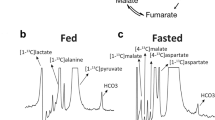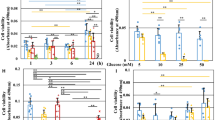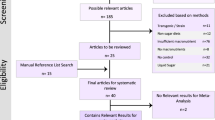Abstract
IT has been pointed out1 that a low activity of hepatic pyruvate kinase (ATP-phosphotransferase EC.2.7.1.40) favours gluconeogenesis, and a high activity favours lipogenesis from oxidizable substances. These experiments with rats showed that the activity of the enzyme was rapidly affected by alterations the amount of carbohydrate in the diet, being highest when the diet contained 55 percent carbohydrate (mostly as starch) and least when it contained no carbohydrate.
This is a preview of subscription content, access via your institution
Access options
Subscribe to this journal
Receive 51 print issues and online access
$199.00 per year
only $3.90 per issue
Buy this article
- Purchase on SpringerLink
- Instant access to the full article PDF.
USD 39.95
Prices may be subject to local taxes which are calculated during checkout
Similar content being viewed by others
References
Krebs, H. A., and Eggleston, L. V., Biochem. J., 94, 3c (1965).
Al-Nagdy, S., Miller, D. S., Qureshi, R. U., and Yudkin, J., Nature, 209, 81 (1966).
Bücher, T., and Pfleiderer, G., in Methods in Enzymology (edit. by Colowick, S. P., and Kaplan, N. O.), 1, 435 (Academic Press, New York, 1955).
Author information
Authors and Affiliations
Rights and permissions
About this article
Cite this article
YUDKIN, J., KRAUSS, R. Dietary Starch, Dietary Sucrose and Hepatic Pyruvate Kinase in Rat. Nature 215, 75 (1967). https://doi.org/10.1038/215075a0
Received:
Issue date:
DOI: https://doi.org/10.1038/215075a0



